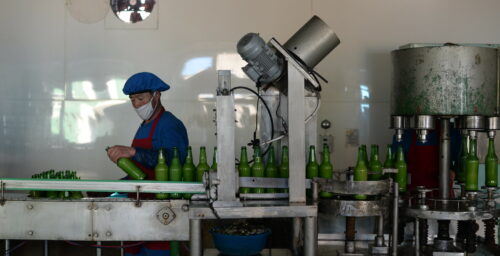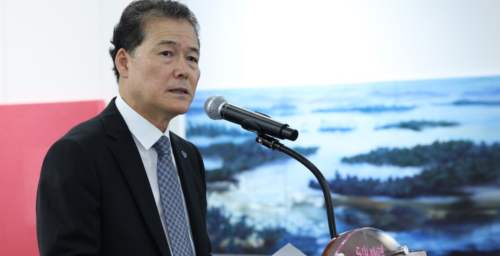The Korean Peninsula has been one of the most volatile and enduring flashpoints of conflict in the world since its division at the end of World War...
Vous n'êtes pas connecté
- English
- Français
- عربي
- Español
- Deutsch
- Português
- русский язык
- Català
- Italiano
- Nederlands, Vlaams
- Norsk
- فارسی
- বাংলা
- اردو
- Azərbaycan dili
- Bahasa Indonesia
- Հայերեն
- Ελληνικά
- Bosanski jezik
- українська мова
- Íslenska
- Türkmen, Түркмен
- Türkçe
- Shqip
- Eesti keel
- magyar
- Қазақ тілі
- Kalaallisut ; kalaallit oqaasii
- Lietuvių kalba
- Latviešu valoda
- македонски јазик
- Монгол
- Bahasa Melayu ; بهاس ملايو
- ဗမာစာ
- Slovenščina
- тоҷикӣ ; toğikī ; تاجیکی
- ไทย
- O'zbek ; Ўзбек ; أۇزبېك
- Tiếng Việt
- ភាសាខ្មែរ
- རྫོང་ཁ
- Soomaaliga ; af Soomaali
Rubriques :
 Maroc - EURASIAREVIEW.COM - A la une - 08/Aug 19:28
Maroc - EURASIAREVIEW.COM - A la une - 08/Aug 19:28
Korean Peninsula On The Brink: A High-Stakes Game For Peace – Analysis
The Korean Peninsula remains one of the most volatile regions in the world, with the potential for conflict ever-present due to the unresolved tensions between North and South Korea. The recent deployment of 250 ballistic missile launchers by North Korea along its southern border represents a significant escalation in military posture, heightening the risk of conflict and threatening regional stability. This development necessitates a multifaceted approach that goes beyond traditional military deterrence. A comprehensive strategy that includes diplomatic mediation, promotion of Korean reunification, and gradual withdrawal of external powers could pave the way for lasting peace on the Peninsula. In this context, countries like Indonesia and Mongolia, known for their neutral stances and diplomatic acumen, could serve as facilitators, fostering dialogue and de-escalation between the two Koreas. This essay argues that by leveraging neutral mediators like Indonesia and Mongolia, initiating steps towards reunification, and advocating for the withdrawal of the four major powers, sustainable peace can be achieved on the Korean Peninsula. North Korea's recent military buildup is concerning not only due to the significant number of missile launchers but also because of the strategic implications it carries. The deployment is a clear indication of Pyongyang's intention to strengthen its deterrence capabilities and assert its influence over the region. The locations of these missile launchers, likely positioned to cover key South Korean targets, emphasize the regime's willingness to project power and maintain an aggressive stance. The threat posed by these missile systems extends beyond the immediate vicinity and includes the broader region, such as Japan and even U.S. territories in the Pacific. Additionally, the presence of these launchers raises the risk of miscalculation, where a minor incident could rapidly escalate into a large-scale conflict, involving regional and global powers. To address this escalation, the role of a neutral facilitator is crucial. In particular, Indonesia and Mongolia stand out as potential mediators. Indonesia's history of non-alignment and its leadership in the Non-Aligned Movement position it as a credible and impartial actor on the global stage. Moreover, Indonesia's active involvement in ASEAN and its diplomatic relations with both North and South Korea make it a suitable candidate to facilitate dialogue. Indonesia has consistently advocated for peace and stability in the region, and its participation could provide a fresh perspective that emphasizes regional solutions to regional problems. Mongolia has a unique role to play in mediating the tensions on the Korean Peninsula due to its geographical location between Russia and China. Unlike the major powers involved, Mongolia has chosen a policy of neutrality and has actively hosted peace dialogues, such as the Ulaanbaatar Dialogue focused on Northeast Asian security. Given its historical ties with both Koreas and its balanced foreign policy, Mongolia is seen as a trustworthy intermediary capable of bringing the parties to the negotiating table. One of the advantages of engaging in dialogue in Mongolia is that it provides a less pressured environment, free from the heavy influences of larger powers, which creates a unique opportunity for constructive and meaningful discussions between the Two Koreas. While neutrality and mediation are crucial in de-escalating tensions, the ultimate solution to the Korean conflict lies in the reunification of the peninsula. The division of Korea is a remnant of Cold War politics, and reunification holds the potential to not only restore historical unity but also bring significant economic, social, and security benefits. A unified Korea could leverage the collective resources and strengths of both North and South, transforming into a regional economic powerhouse. Additionally, reunification could address the dire humanitarian crisis in North Korea, where millions suffer from poverty and repression under a controlling regime. However, the process of reunification is complex and must be carefully planned and executed. Initially, efforts should prioritize building trust through economic cooperation, such as joint industrial projects and infrastructure development, which can create interdependence and reduce the likelihood of conflict. Cultural exchanges and family reunions should also be emphasized to foster human connections and rebuild the torn social fabric resulting from decades of division. Over time, these initiatives can pave the way for more substantial political integration, leading to eventual unification under a single government that represents the interests of all Koreans. One of the main obstacles to reunification and long-term peace is the presence and influence of the four major powers: the United States, China, Russia, and Japan. Each of these countries holds strategic interests in the Korean Peninsula, further complicating the situation. The United States maintains a significant military presence in South Korea, primarily to deter North Korean aggression but also to project power in the Asia-Pacific region. China, while officially endorsing a stable and denuclearized Korean Peninsula, perceives North Korea as a buffer state against U.S. influence in East Asia. Russia and Japan also have their strategic calculations that often conflict with the pursuit of peace and reunification. To achieve lasting peace, it is crucial to gradually diminish the military presence and impact of external powers. This entails a phased disengagement rather than an abrupt withdrawal to prevent destabilization in the region. Moreover, strong international assurances for the security of a unified Korea should accompany this process. The United Nations can play a critical role by overseeing the disengagement and ensuring that both North and South Korea feel sufficiently secure to pursue reunification without external intervention. Additionally, the establishment of a multilateral security framework involving regional stakeholders, including ASEAN, could provide a platform for ongoing dialogue and the prevention of conflicts. Despite the challenges involved, attaining peace on the Korean Peninsula is not only desirable but also achievable through a combination of diplomacy, regional cooperation, and international support. Indonesia and Mongolia, as impartial actors, can play a pivotal role in bridging the divide between North and South Korea. Their involvement can facilitate dialogue and build trust. The gradual reunification of Korea, coupled with the withdrawal of external powers, lays the groundwork for a stable and prosperous Korean Peninsula that can contribute to broader regional security. In conclusion, the recent escalation by North Korea highlights the urgent need for a comprehensive and innovative approach to peace on the Korean Peninsula. By engaging neutral mediators such as Indonesia and Mongolia, advocating for steps towards reunification, and promoting the gradual withdrawal of the four major powers, the groundwork for sustainable peace can be established. Undoubtedly, the process will be intricate and filled with challenges, but the potential rewards—a peaceful unified Korea and a stable Northeast Asia are well worth the endeavour. The opinions expressed in this article are the author's own. Bibliography Cumings, Bruce. Korea's Place in the Sun: A Modern History. W.W. Norton & Company, 2005. Revere, Evans J.R. "The North Korea Nuclear Problem: Twenty Years of Crisis." The Brookings Institution, 2020. Snyder, Scott. South Korea at the Crossroads: Autonomy and Alliance in an Era of Rival Powers. Columbia University Press, 2018. Oh, Kongdan, and Ralph Hassig. North Korea through the Looking Glass. Brookings Institution Press, 2000. Lee, Ji-Young. "The Ulaanbaatar Dialogue and Mongolia’s Role in Northeast Asian Security." The Asan Forum, 2019. "ASEAN and the Korean Peninsula: ASEAN's Role in Fostering Peace." ASEAN Studies Centre, ISEAS–Yusof Ishak Institute, 2021.
Articles similaires
Rising Tensions In The South China Sea: Can Diplomacy Prevent Conflict – Analysis
The South China Sea has long been a focal point for geopolitical tensions due to conflicting territorial claims made by several Southeast Asian...
SCO Summit: A Diplomatic Deadlock Or A Chance For Change? – OpEd
The upcoming Shanghai Cooperation Organisation (SCO) summit, scheduled to take place in Islamabad on October 15-16, was initially viewed as a...
SCO Summit: A Diplomatic Deadlock Or A Chance For Change? – OpEd
The upcoming Shanghai Cooperation Organisation (SCO) summit, scheduled to take place in Islamabad on October 15-16, was initially viewed as a...
Putin’s Mediation Proposal: Can China, Brazil, And India Navigate The Ukraine Crisis? – Analysis
Introduction In a significant diplomatic move, Russian President Vladimir Putin has put forward a proposal to address the protracted conflict in...
The Next US President Should De-Colonize Eurasia – OpEd
With Russian influence in decline and its army weakened by defeats in Ukraine, it is an opportune time for the next US president to de-colonize...
Japan-South Korea: Kishida-Yoon Final Summit Major Takeaways – Analysis
Japanese Prime Minister Fumio Kishida visited Seoul on 6-7 September 2024 for a summit with South Korean President Yoon Suk Yeol. It was a farewell...
Fact check: Russia greenlit imports of beer from China, not North Korea
Russia issued a license for a local company to import beer from China, not North Korea, contrary to reports in Russian and South Korean media. The...
Seoul’s unification ministry looks to cut spending on North Korea cooperation
The Yoon administration has proposed a 3.7% decrease in funding for the unification ministry next year, singling out inter-Korean cooperation and...
The Dangers Of China’s Approach To Peace Mediation – Analysis
By Dr. Sandip Kumar Mishra China recentlyinvitedrepresentatives from 14 Palestinian groups for reconciliation talks; the meeting was held on on...
Les derniers communiqués
-
Adobe Brings Conversational AI to Trillions of PDFs with the New AI Assistant in Reader and Acrobat
Adobe - 21/02/2024
-
Laura Frigenti takes the Helm as Chief Executive Officer of the Global Partnership for Education
Global Partnership for Education - 05/12/2022

